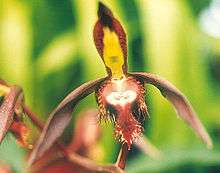Catasetinae
Catasetinae is a subtribe within the Orchidaceae and contains 8 genera.[1] Its members are widespread in lowland tropical Central and South America up to 1,500 meters. They are found on trees, stumps or old fence posts.
| Catasetinae | |
|---|---|
 | |
| Catasetum saccatum | |
| Scientific classification | |
| Kingdom: | Plantae |
| Clade: | Tracheophytes |
| Clade: | Angiosperms |
| Clade: | Monocots |
| Order: | Asparagales |
| Family: | Orchidaceae |
| Subfamily: | Epidendroideae |
| Tribe: | Cymbidieae |
| Subtribe: | Catasetinae |
| Genera | |
|
See text. | |
Catasetinae are exclusively pollinated by male euglossine bees, which are attracted to the floral fragrances, and collect them. A particular Catasetinae species may attract only one or a few species of bees from the dozens that occur in the habitat.[2]
Genera
- Catasetum (80-120 species)
- Clowesia (7 species)
- Cyanaeorchis (3 species)
- Cycnoches (some 30 species)
- Dressleria (10 species)
- Galeandra (37 species)
- Grobya (5 species)
- Mormodes (some 70 species)
The related genus Cyrtopodium is separated as subtribe Cyrtopodiinae.
Footnotes
- Batista, J.A.N., A.C.M. Mota, K. Proite, L.D.B. Bianchetti, G.A. Romero-González, H.M.H. Espinoza, and G.A. Salazar. 2014. Molecular phylogenetics of Neotropical Cyanaeorchis (Cymbidieaee, Epidendroideae, Orchidaceae): geographical rather than morphological similarities plus a new species. Phytotaxa, 156(5): 251-272.
- Williams & Whitten 1983
gollark: Are you using the normal thing or the CLIP-sorted thing?
gollark: Interesting.
gollark: Wrong.
gollark: As you can see, it continues.
gollark: ?urban apioform
References
- Williams, Norris H. & Whitten, W. Mark (1983): Orchid floral fragrances and male euglossine bees: methods and advances in the last sesquidecade. Biol. Bull. 164: 355–395.
This article is issued from Wikipedia. The text is licensed under Creative Commons - Attribution - Sharealike. Additional terms may apply for the media files.